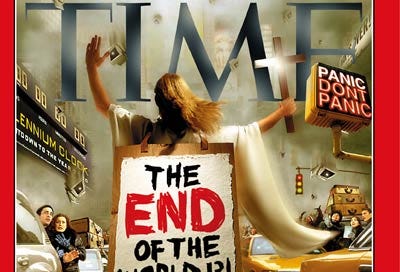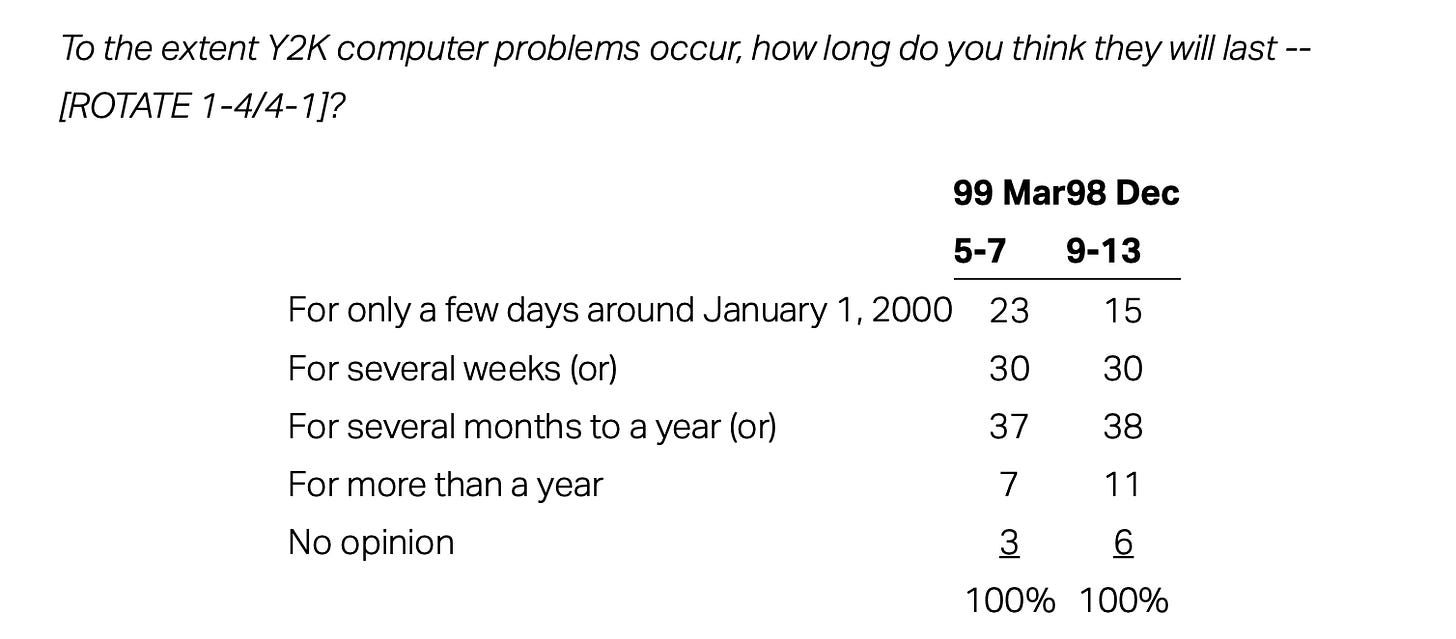Last week, I discussed hindsight bias and the “uncertainty illusion” — how hindsight bias makes the past look less uncertain and scary than it was, which in turn makes the present and future look more uncertain and scarier. (I should note, for the sake of completeness, that these perceptual biases are independent of the question of how uncertain and scary the present and future really are. If you’re looking around and thinking things are unusually scary, that may be because things are unusually scary; or it may be the work of the uncertainty illusion; or both. Reality is complicated.)
To illustrate, I asked readers to identify some golden years in the past. Years when there was peace and prosperity. Years without worry. Years we long for whenever Donald Trump appears in the news. (Sorry. Editorial comment. It won’t happen again. Often.)
With those years in hand, I would dig into the archives and reveal the forgotten fears.
I could have predicted some of the years you came up with. A few were surprises. But they span a nice wide range — 1999, 1996, 1994, 1993, 1957, 1976, 1972, 1967, 1961, 1958, 1924, and 1911 — from recent history to more than a century ago. So this should make for a fun exercise.
However, I quickly realized I can’t respond to the whole list, so I’ll pick one or two from each era. (I see my readers think highly of the 1990s. I shall enjoy disabusing you.)
I also realized I couldn’t deal with even a shortened list in a single post. So what I will do instead is make it one year, one post.
Today, we’re going to party like it’s 1999. (Ask your parents, Gen Z.)
Personally, this is the year I would have put at the top of my list of golden years. I was young, energetic, and ambitious. I had thick, lustrous hair. Yes, indeed, 1999 was a fantastic year. (It’s amazing how good years and youth coincide in people’s memory.)
But personal affinity aside, there really are solid reasons to think 1999 was an outstanding year. By all the standard metrics — unemployment rates, economic growth, stock markets, crime rates, you name it — things were sweet. Picture an American presidential primary campaign in which all the candidates, of both parties, are nice, reasonable, and civil. That’s followed by a general election campaign in which both parties’ candidates are avowed moderates — one called himself a “compassionate conservative” — who civilly debated how to spend the massive surpluses the federal budget was projected to generate for the foreseeable future. Pundits complained it was boring.
I swear Gen Z, it happened like that.
So, yeah, there was a lot that was pretty good.
But is that all there was to 1999? Oh no.
Let’s start with one of the first cover stories of Time magazine that year.
Y2K. The Millennium Bug. Come January 1, 2000, computers everywhere would glitch, systems would shut down, and things would get weird.
Pretty much nothing happened. And remember how hindsight bias works? I don’t know anyone who was an adult then who admits to being worried about Y2K. No one stocked up on canned food and ammunition. No one took out a big whack of cash from the bank “just in case.”
But what were Americans saying in 1999? Following are summaries of Gallup polls taken that year.
These are not sky-is-falling numbers. But they show significant, widespread concern of serious problems ahead. And when that didn’t happen, the whole thing became a joke. Of course it didn’t amount to anything! I knew it all along!
That, my friends, is textbook hindsight bias.
Of course Y2K was an especially weird case. But everything else in the 1999 was ducky, right?
Here is the cover of Time at the beginning of February, 1999.
The “Committee To Save The World” has “prevented a global economic meltdown — so far.” Even if you know nothing about who these guys are or what the threatened meltdown was — it was the long-forgotten Asian currency crisis — that is scary. And it is strong evidence that serious people were seriously worried about the international financial system and the global economy. (“Globalization” was the cool word of 1999, by the way. Hipsters read Naomi Klein. Dorks read Thomas Friedman. Verily, it was a golden age.)
OK. Computers, scary. International finance, scary. Anything else?
Oh, yes.
The Columbine massacre, in Littleton, Colorado. A horrible tragedy. What followed was a full-blown social panic that went on for months.
What is wrong with young people?!? Violent video games. Marijuana. Divorce. Social mobility. Goth music. Marilyn Manson. (Ask your parents, Gen Z.) You name it, someone blamed it for turning young people into raging maniacs.
And schools into death traps.
Another Gallup poll:
In Risk, I wrote extensively about Columbine and its aftermath. A quick summary: While just about everyone in America was convinced that school violence was soaring out of control, driven by a whole sociopathic generation, school violence was, in fact, plunging. And schools were the safest place for children to be.
At least Columbine, the Asian currency crisis, and Y2K are remembered today (if only barely). Lots more bad things happened in 1999 that have vanished from memory entirely.
In Atlanta, a day trader in financial trouble murdered his family and a bunch more people. See how “day trading” is singled out above? Day trading was the hot new thing in a booming stock market, so naturally this atrocity revealed … something or other … about the dangers of day trading.
Oh, and remember the Kosovo War? Genocide. Bombings. Lots of people dead. Doesn’t ring a bell? At one point, Russian and NATO soldiers were eyeball-to-hostile-eyeball and there were fears they might start shooting each other long after the end of the Cold War.
And on the last day of 1999, Boris Yeltsin handed over his kleptocracy to former KGB agent Vladimir Putin.
So, yes, 1999, was in many ways a good year. But, no, it was not the golden year we perceive it to be now.
That’s hindsight bias talking.













I think it was in "Futurama" where someone said, "if you've done everything right, it will be like you've done nothing at all." Y2K is a great example. We don't know for sure if it would have been that bad left unchecked, but all the work done to fix the problem ensured that nothing happened - and now the conventional wisdom is that it was always overblown if not an outright scam.
"Duck and Cover" in the fifties is a similar example. Because it was so intertwined with the Red Scare (which in turn was so overblown that people now *underestimate* how many Soviet moles were in the US government, but that's another post) it's written off as Cold War propaganda meant to make people think nuclear war was survivable.
Indeed, if you were near Ground Zero it wouldn't help at all. But if you're further away from the blast, debris, building collapses and shattered glass are your most pressing concerns. Hiding under a desk could literally save your life.
I can add to the aviation fears with a very real data point. If you compare traffic at Heathrow Airport New Year's Eve and New Year's Day 98/99 and 00/01 with 99/00 those two days were down about two thirds on the year's either side.